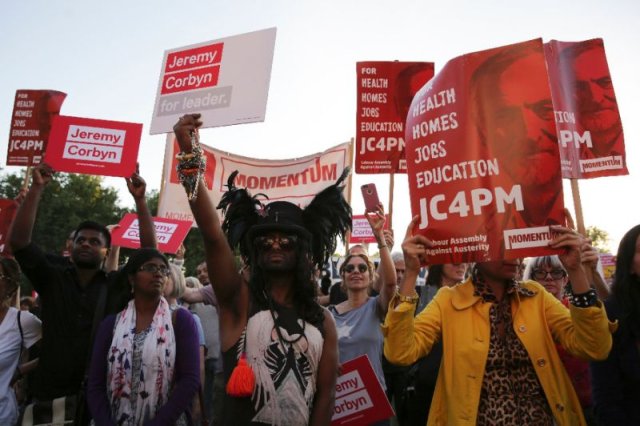
This year, progressive people in Australia have had more cause than usual to pay attention to international politics.
US President Donald Trump on the right shows the depths to which capitalist politics can plunge while British Labour leaderJeremy Corbyn on the left has given many cause for new hope and inspiration.
On climate, Trump has shown he is prepared to take the planet past the point of no return. His attempted travel bans and “build the wall” rhetoric prove he has no qualms in whipping up extreme racism. Sacking FBI director James Comey was one more public declaration that he is running an authoritarian administration.
It is tempting to dismiss Trump as an isolated example of an extreme-right buffoon who accidentally got into a position of power. However, the reality is that his presidency is one expression of an international trend caused by a crisis in mainstream capitalist politics. Other examples include: Marine Le Pen's 10 million votes (34%) in the French presidential elections; the rise to power of Rodrigo Duterte in the Philippines; and even the “hard Brexit” pushed by the Tories until recently in Britain.
On the other hand, the strong showing for British Labour under their most radical and progressive platform in decades shows that there is an alternative, both to mainstream neoliberalism as well as the far right. Corbyn's Labour is also part of an international trend which includes: the Bernie Sanders' campaign in the USA; the growth of Podemos and other left forces in Spain; the Green president of Austria; and others.
The right current is represented in part in Australia by Pauline Hanson's One Nation. However, there is yet to be a prominent mass expression of the radical leftism of the Corbyn type in this country.
Nevertheless, progressive people are searching for the vehicles to make it happen.
One reflection of this is the survey being promoted by online activist group GetUp!.
The survey is canvassing opinions for a “people's manifesto”.
GetUp has surveyed its supporter base many times, ostensibly to seek direction for the organisation. In practice these surveys often have limited options and are designed more as a device to make people feel they are being listened to than to actually direct the organisation.
The questions asked indicate the kinds of answers they want.
This year’ssurvey seems to indicate that its authors believe the Corbyn and Sanders movements either can or have already generated a lot of interest in Australia. The survey explicitly asks: would you “like to see a campaign for economic justice in Australia, similar to Jeremy Corbyn in the UK or Bernie Sanders in the US”.
Further, it puts a strong emphasis on dealing with inequality, campaigning for public ownership, and tackling corporate power in various ways. It raises ideas such as a shorter work week and a universal basic income.
The section on inequality is introduced with the statement that “Inequality is skyrocketing as large corporations and the 1% are hoarding ever more wealth and power — at the expense of everyday people. Solutions to inequality that merely tinker with our broken system have been proved insufficient time and time again. We need bold new approaches to return the balance of wealth and power to everyday people.”
In short, it is a more radical approach.
Another indication that Sanders and Corbyn are having an impact in Australia is the sniffing around by former Treasurer Wayne Swan, who visited Sanders in the US. Since his return, he is pushing for higher corporate taxation and unspecified improvements in workers' rights.
When looking at international developments, it is important not to reduce these social movements down to simply one charismatic individual. Instead, individual leaders become figure heads for mass movements for change. There is no reason to expect that these developments will happen the same way in different countries.
For instance Corbyn and Sanders each built support within one of the mainstream capitalist parties in their respective countries. The Democrats did their best to kill off Sanders' campaign. The British Labour party tried the same but so far has not been successful.
It is hard to see space within the Australian Labor Party for a genuine radical current to gain prominence. Perhaps there is more hope in the Greens, though the recent public attacks on left-wing Senator Lee Rhiannon seem to underscore the pragmatic drift in that party.
Arguably the best approach we can take to help create the conditions for a mass left-wing break to occur is to build the social movements such as the #StopAdani campaign, the campaign against unconventional gas and the movement for refugee rights.
Among political parties, the Socialist Alliance most confidently supports the call for bold action and a refusal to be bound by conventional politics. We actively campaign for public ownership, including in the banking, mining and energy sectors. We also campaign for popular power to replace corporate power. Joining and getting active in Socialist Alliance is a practical way to work today towards building the mass left-wing break that we need.
[Alex Bainbridge is a national co-convenor of Socialist Alliance.]
Like the article? Subscribe to Green Left now! You can also like us on Facebook and follow us on Twitter.